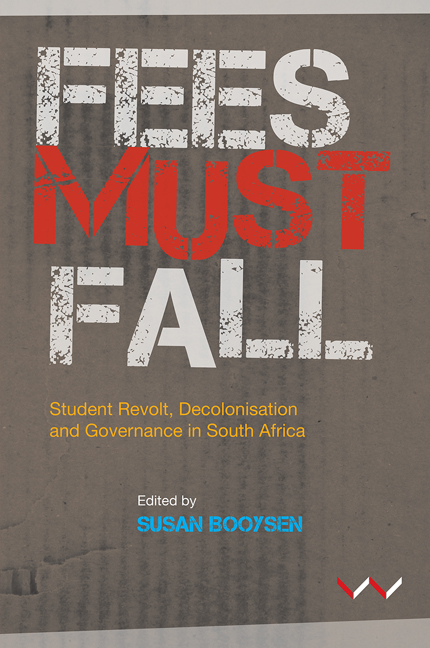Book contents
- Frontmatter
- Contents
- Acknowledgements
- Preface
- Introduction
- PART ONE POWER REDEFINED – ‘WHAT HAPPENED TO GOVERNANCE?’
- PART TWO PRIMARY VOICES – ‘THE ROOTS OF THE REVOLUTION’
- Chapter 2 The roots of the revolution
- Chapter 3 The game's the same: ‘MustFall’ moves to Euro-America
- Chapter 4 #OutsourcingMustFall through the eyes of workers
- Chapter 5 Documenting the revolution
- PART THREE THE REVOLT – ‘RISING AGAINST THE LIBERATORS’, SOUTH AFRICA IN AFRICA
- PART FOUR POWER AND CLASS REDEFINED – ‘SIT DOWN AND LISTEN TO US’
- PART FIVE JUSTICE, IDENTITY, FORCE AND RIGHTS – ‘WE CAME FOR THE REFUND’
- APPENDICES
- Contributors
- Index
Chapter 3 - The game's the same: ‘MustFall’ moves to Euro-America
from PART TWO - PRIMARY VOICES – ‘THE ROOTS OF THE REVOLUTION’
Published online by Cambridge University Press: 20 April 2018
- Frontmatter
- Contents
- Acknowledgements
- Preface
- Introduction
- PART ONE POWER REDEFINED – ‘WHAT HAPPENED TO GOVERNANCE?’
- PART TWO PRIMARY VOICES – ‘THE ROOTS OF THE REVOLUTION’
- Chapter 2 The roots of the revolution
- Chapter 3 The game's the same: ‘MustFall’ moves to Euro-America
- Chapter 4 #OutsourcingMustFall through the eyes of workers
- Chapter 5 Documenting the revolution
- PART THREE THE REVOLT – ‘RISING AGAINST THE LIBERATORS’, SOUTH AFRICA IN AFRICA
- PART FOUR POWER AND CLASS REDEFINED – ‘SIT DOWN AND LISTEN TO US’
- PART FIVE JUSTICE, IDENTITY, FORCE AND RIGHTS – ‘WE CAME FOR THE REFUND’
- APPENDICES
- Contributors
- Index
Summary
INTRODUCTION
It is the 23rd of October 2015. About 350 people are gathered outside the South African High Commission in London. Familiar struggle songs ring out. This could be a protest at any South African university, but for the British accents, slight chill in the air and faces of smiling police officers in brilliant neon jackets. A collection of students and South Africans abroad under the banner of #FeesMustFall demand to see the high commissioner. A stand-off ensues: the high commissioner is in a meeting and cannot come out, according to a member of his staff. ‘We're not leaving until he does,’ cry hundreds of voices. The high commissioner eventually emerges, smiling at the crowd as if at a rally. The crowd erupts, out of relief, not reverence, then crouches in silence. A debate follows over whether the high commissioner should sit on the paved floor, or whether he should use a regal chair produced moments earlier by a subservient staffer. Jeers abound as the chair dances its way over the top of the front of the crowd. The protesters want him to sit on the floor à la Habib. He does. A memorandum is signed, the international media capturing the high commissioner's every facial twitch. Not since the anti-apartheid struggle has the South African High Commission seen an event like this.
As the London protest spreads on social media, #FeesMustFall in South Africa is preparing to march on the Union Buildings. Rhodes has already fallen at the University of Cape Town (UCT), and Oxford is battling to decide whether to remove its own Rhodes monument. Students at the most prestigious universities in the US also call for the removal of symbols linked to slavery. An old conversation is awaking in new ways.
One of the most neglected aspects of the ‘Must Fall’ movement is its spread to Euro-America. Oxford has seen sustained protest under the #RhodesMustFall banner since May 2015, centring on a statue of Cecil Rhodes located on its High Street. Under pressure from a campaign called ‘Royall Must Fall’, the Harvard Law School has abolished its official crest, an ode to the slave-owning Royall family. Significant debates have raged in both Britain and the US over the apparently unapologetic public attitude of universities towards the legacy of slavery and colonialism, spurred on – and in many cases directly inspired – by events in South Africa.
- Type
- Chapter
- Information
- Fees Must FallStudent revolt, decolonisation and governance in South Africa, pp. 74 - 86Publisher: Wits University PressPrint publication year: 2016

